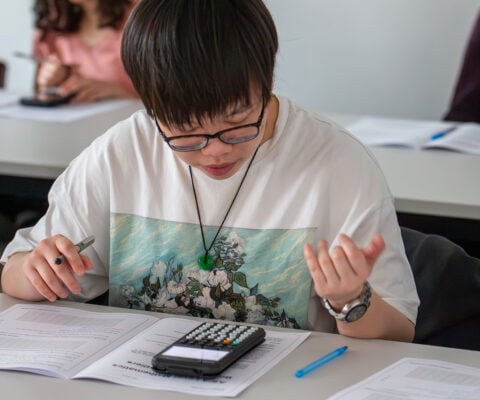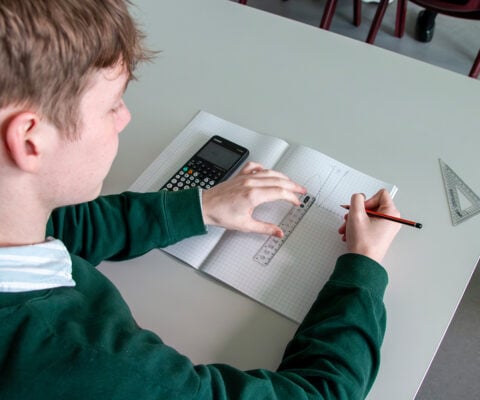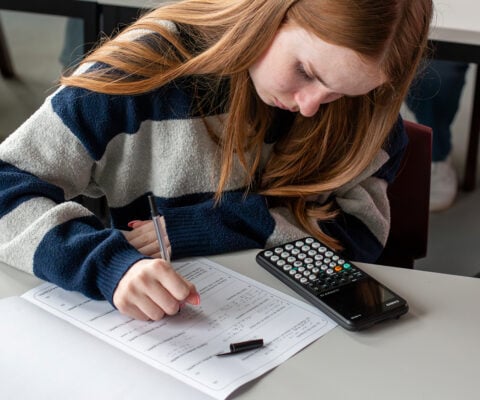What is Further Maths
A-level?
Find out everything you need to know about further maths A-level options and how these differ from other maths courses.

Further maths
Choosing a maths A-level can be a gateway to a wide range of career options. But for students who enjoy maths and have plans to use this in their future, both at undergraduate level and beyond, the standard A-level mathematics course may not be enough.
This is where further maths comes in. This course offers a wider and deeper study of critical mathematical concepts and topics, building on core areas such as algebra and calculus, while also introducing new areas of study such as complex numbers and matrices.
The Department of Education notes: “A-level further mathematics prepares students for further study and employment in highly mathematical disciplines that require knowledge and understanding of sophisticated mathematical ideas and techniques.”

Difference Between A-level Maths and Further Maths
Further maths is an extension of the A-level mathematics course, although it does provide a separate qualification. Students taking further maths will also be taking maths A-level. While both include pure maths, – further maths goes into much greater depth and has options to study more pure and applied topics..
In terms of difficulty, further maths is a significant step up from A-level mathematics. As such, it is usually only considered by students who have achieved the highest grades at GCSE. Generally a 7 is considered the minimum, but in practice, those with a grade lower than an 8 or 9 at GCSE may struggle more with the material.
For those who have already demonstrated both an aptitude and an enthusiasm for maths, it remains a popular choice. However, only around 15,000 students a year take further maths, compared with around 100,000 who took A-level maths exams in 2024.

Why Choose Further Maths A-level?
Students who plan to pursue maths-focused courses at university level will benefit greatly from having a further maths A-level. While many university courses will look favourably on applications with this subject, some courses make it an essential requirement.
For example, according to the Welsh government, 33 per cent of mathematics undergraduate courses mention further maths in their entry requirements. This rises to 60 per cent for Russell Group universities.
It is not only maths-based courses that benefit from further maths. Studies in areas such as physics, engineering and computer science will also find further maths a highly useful topic. Some of the subjects where further maths is frequently listed as useful include:
Actuarial Science
Aeronautical Engineering
Biochemistry
Biomedical Sciences
Chemical Engineering
Chemistry
Civil Engineering
Computer Science
Dentistry
Electrical/Electronic Engineering
Materials Science
Mathematics
Mechanical Engineering
Medicine
Physic

Aside from the boost it can offer to students’ future education and employment prospects, most individuals who take further maths courses find them highly rewarding and enjoyable experiences. Provided they already have a passion for the subject, many students enjoy the additional challenges that further maths provides, as well as the opportunity to explore new and more advanced mathematical concepts.
A-level Further Maths Syllabus Overview
Like in A-level maths, further maths courses focus on understanding mathematical arguments and language, mathematical problem-solving, and mathematical modelling. However, these skills will be examined against a much more complex range of content in exams.
Regardless of exam board, A-level further maths includes a set core of topics that will account for 50 per cent of the course’s content – with the remainder being prescribed by the examining organisation. This second half of the course may build on topics covered in A-level maths in greater depth or introduce new applications. Common options for this include statistics, discrete maths, mechanics and additional pure maths.

Content that must be covered as part of any A-level further maths course include:
Proofs: Students will be required to construct proofs using a variety of different proof techniques, including direct proofs, proof by contradiction, and proof by induction.
Complex numbers: Including solving any quadratic equation with real coefficients and adding, subtracting multiplying and dividing complex numbers. These methods have applications in areas such as engineering, physics and computer science.
Matrices and linear transformations: This includes topics such as matrix operations, determinants, eigenvalues and eigenvectors, and matrix transformations. Students must demonstrate the ability to use calculators to perform operations.
Further algebra and functions: Further maths a-level courses will introduce students to ordinary differential equations, methods to solve them and analysis of their solutions.
Further calculus: Among the topics where students will delve deeper into calculus are the differentiation and integration of more complex functions, including exponential, logarithmic and trigonometric functions.
Other areas that are included on further maths courses include further vectors, polar coordinates and hyperbolic functions.

Study Tips for Success in Further Maths A-level
Familiar revision practices will also apply to further maths, but due to the complex nature of the material, students will benefit from a strong focus on the topic. There are some specific methods that will be useful for further maths that students should keep in min.
Practice past papers: Further maths exams can be quite demanding and include a range of question types that students will not have come across at GCSE or A-level. Knowing what to expect and what is being asked of them is vital and real-world past papers are ideal for this.
Get comfortable with your calculator: Having the best calculators for A-level maths is vital to success at this level. Powerful graphing devices like the fx-CG100 are essential for dealing with the complex topics at hand. To get the most out of the calculator, it’s important students are confident with all its functionality. Devoting lesson time to this with the use of emulators, for example, is a great way to ensure all students have the calculator knowledge they need.
Emphasise independent study: With so many complex topics to cover and limited time in lessons, all students taking further maths will need to be comfortable managing their own time and finding their own resources. Setting a clear schedule that includes time for breaks, mixing up revision techniques to avoid things getting stale and taking advantage of online resources all play a part in this.

Tools and Resources for Further Maths
Using the full range of available resources will be essential in preparing for further maths exams. Programs and tutorials specifically designed to guide students through these rigorous courses are invaluable in understanding the materials. Places to look include the following:
Exam boards The accredited exam boards for further maths – AQA, Edexcel and OCR – all offer a range of online resources including worksheets and past papers to help students prepare for their exams.
Online tutorials: The internet provides a wide range of video lessons and interactive resources such as quizzes to help make further maths more manageable. Casio also offers a range of resources that can help when it comes to understanding calculators.
Revision guides: Dedicated further maths textbooks are another great way to have concepts explained in depth. However, these can be pricey so may not be a practical option for all students without support.

Common Challenges in Further Maths and How to Overcome Them
Further maths is often seen as one of the most challenging subjects students can take at A-level. Therefore, it will be natural for some individuals to experience some struggles during the course. However, by knowing some of the most common issues likely to be encountered, teachers and students should be able to work together and overcome them.
Frequent challenges found when studying further maths include:
High workload: Further maths is a demanding course and has a heavy workload compared to many other A-level subjects. Most students will be taking both maths and further maths, so are likely to be spending at least half their study time on the subject. Therefore, effective revision and time management strategies are important.
New concepts: Areas such as calculus and advanced modelling will be new to students, so should be an area of focus both inside and outside the classroom. It’s important to understand how technology such as calculators can be used effectively in this area, and students should always feel able to ask for help in areas where they’re having difficulties.
More open-ended questions: Further maths aims to test students on how to apply principles to a range of situations, so exams are likely to include many more open-ended questions than standard papers. Many students find these less-structured questions more difficult, so it can be useful for them to have the opportunity to practice on past papers beforehand.